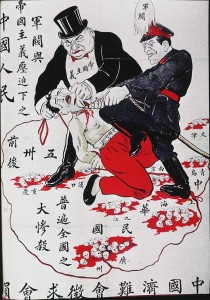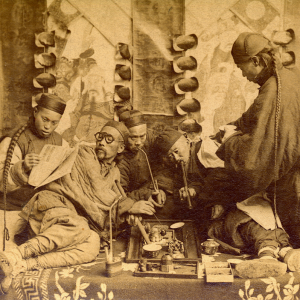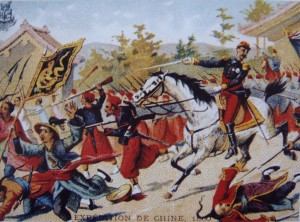in what way did the canton system seek to control trade

For centuries, Westerners had nurtured a strong interest in China, which they viewed both every bit a place of Oriental mystery and economical opportunity. From the 18th century, Europeans steadily increased their presence and influence in China, not without opposition. This strange imperialism in Mainland china would go a notable source of revolutionary sentiment.
Seeds of European imperialism
European involvement in China dates dorsum to Marco Polo, the Venetian explorer who completed two expeditions to China in the late 1200s. Polo published a widely read account of his voyages. For generations, his work remained the just authoritative European text on China.
The Age of Exploration in the 1500s produced an increase in Western expeditions into Asia. Over the next three centuries, Britain, French republic, Spain, Holland and Portugal established colonies and merchandise links in Asia. Of the five majestic powers, the British were comparative latecomers to Asia, conquering Bharat, Penang, Singapore, Burma and other territories past the late 1700s.
Past the mid-19th century even Japan, previously an island closed to foreigners, had succumbed to Western pressure. The event of Japan opening its borders was a rapid transformation from feudalism to modernistic industry.
Christian missionaries
The encroachment of Western powers into Asia had a profound bear upon on China. With its manufacturing economic system, natural resources and enormous population, the Heart Kingdom was a rich prize for Western capitalists. Their actions would undermine the weakening Qing government.
Among the beginning foreigners to arrive in Prc were Christian missionaries. Franciscan monks travelled there in the 13th century, followed by a moving ridge of Jesuits in the 16th century. One of these Jesuit missionaries, Johann Adam Schall von Bell, became an influential advisor to the first Qing emperor.
Others European missionaries travelled effectually China, preaching and converting Chinese to Christianity, a process that aggravated imperial rulers and occasionally prompted bans on Christian action.
Economic imperialism
The kickoff steps toward economical imperialism in China appointment from the mid-1500s, when Portuguese traders paid for access to ports in Macau on China's far southward-east declension. In 1711, the British East Bharat Company also established a trading post there.
Over the next few decades, the Qing leadership tried to restrict foreign merchandise to Macau and the surrounding region, though their efforts were largely in vain.
In 1757, the Qing introduced the county system, requiring strange companies to trade with a Chinese merchant commonage – not direct with the Chinese people. These attempts to limit and control strange merchandise activity failed and it began to spread beyond the due south-east.
The opium scourge

The British shortly became China'south largest foreign trading partner. British companies purchased vast amounts of Chinese tea, as well as luxuries like silks, porcelain and other decorative items. Wealthy Chinese were likewise avid consumers of British-made gold, silver and jewellery.
Toward the end of the 18th century, British ships began importing a more than controversial item into China. Information technology would lead to social deposition, deteriorating relations and, eventually, war.
Opium is an addictive narcotic extracted from the poppy blossom and commonly taken through smoking. Opium was used in People's republic of china as early every bit the 15th century, though opium smoking had been largely restricted to the privileged classes.
British ships began landing supplies of opium in China in the tardily 1700s and early 1800s, mainly around the mouth of the Pearl River in Guangdong. Opium became more bachelor and more affordable to all levels of Chinese order, fifty-fifty the working classes.
Once the hobby of emperors and rich men, opium smoking soon flourished. Chinese towns and cities had numerous 'opium dens', where thousands of men lingered and spent their days in a drug-induced stupor.
The Starting time Opium State of war

Qing leaders understood the social and economical dangers posed past opium. Beijing attempted to ban its utilize and importation several times – but these restrictions were hard to enforce and the British generally ignored them.
In 1838, a Qing commissioner seized and destroyed 20,000 cases of British-imported opium, a motility that triggered the First Opium War (1839-1842). Though Qing forces heavily outnumbered the British, they lacked Uk's naval force and artillery firepower and so were comprehensively defeated.
This defeat resulted in a humiliating treaty. The Qing government was forced to grant Uk 'virtually favoured nation' condition, giving it precedence over other foreign powers. The region around the Pearl River delta, now the location of Hong Kong, was ceded to British control.
The Second Opium War
A second Opium State of war began in 1856 afterwards Uk tried levering Qing officials into even more concessions, including the legalisation of opium. Once again, the Qing military suffered a humiliating defeat and the emperor was forced into a one-sided treaty.
The Treaty of Tientsin (1860) removed the last significant barriers to foreign imperialism in China. The nation'southward ports were thrown open to foreign ships. Opium apply and importation were legalised.
In addition, restrictions on Christianity were removed and foreigners were permitted to travel freely around China. Strange governments were permitted to establish legations (diplomatic compounds) in the imperial capital, Beijing – legations that were later attacked during the Boxer Rebellion (1900).
China opened to the West
With the doors to China at present thrown open up, strange diplomats, officials, traders and missionaries poured in through the second half of the 19th century.
The more than aggressive strange imperialist powers – United kingdom of great britain and northern ireland, France, Germany, Russia and Japan – negotiated with regional officials and warlords to construct their own 'spheres of influence' within Cathay. Foreign merchants and agents came to exert strong influence, if non command, over government and commerce in these regions.
The growth of these 'spheres of influence' created a patchwork of strange enclaves that functioned nigh as virtual colonies within Red china'south borders. The Qing rulers retained their sovereignty and control of the national government, though in reality much of Mainland china was under strange control.
Many observers believed Mainland china would eventually disintegrate into several discrete colonies, each controlled past a strange power. This thought was reflected in Western cartoons that depicted China as a gigantic pie or cake, carved up and devoured by European monarchs. Meanwhile, the Qing regime seemed utterly unable to prevent or resist this process.

The First Sino-Japanese War
To make matters worse, in 1894 Red china again institute itself at war, this time with Japan. The Offset Sino-Japanese War, as it became known, began over disputed territorial control of the Korean peninsula.
This war was another disaster for People's republic of china. The Japanese had spent the previous quarter of a century embracing industrialism, modern product methods and Western approaches to military command and system. In contrast, the Qing had spent most of this period resisting modernisation.
As a effect, the Sino-Japanese War was enormously lopsided, lasting just viii months and ending with some other burdensome defeat. China was forced to cede Korea, the island of Taiwan and the Liaodong Peninsula to Nihon. Control of Liaodong gave the Japanese a foothold in Manchuria, where they would phase an invasion of People's republic of china during the 1930s.
American imperialism
In 1899 yet another strange power, the United States, entered the fray. Concerned that the European and Japanese carve-upwards of China threatened American commercial interests in Asia, U.s.a. diplomats negotiated an 'open door policy' for American merchandise in China.
These negotiations, however, were washed with the other imperial powers in China – not with the Qing government. Beijing was informed rather than consulted, a mensurate of how impotent and irrelevant the Qing regime had get.
Equally the 19th century came to an finish, Prc institute itself drug-addled, divided, exploited by foreign interests and plagued past decadent officials. The Qing lacked the political will, national say-so, popular support and armed services strength to respond to these challenges.
Amongst the long-suffering Chinese, many believed the 350-twelvemonth-old Qing dynasty had surrendered its ability and lost its Mandate of Heaven and that a change of authorities was imminent. They would not accept long to expect.
A historian's view:
"Americans were false friends. Russians were unpredictable and, what was much worse, inefficient. The Japanese were predators, but that was no surprise. But in Chinese optics, the main foreign encumbrance was still the presence of United kingdom of great britain and northern ireland, its start invader. Information technology was Cracking United kingdom of great britain and northern ireland, reported the British vice-delegate in Canton, 'with her discipline peoples and her history of conquest in India and Egypt, who is constantly denounced in the press and by the student body equally an 'arch-imperialist' and the oppressor of China'."
A. P. Thornton

1. The beginning significant contact between China and Europeans began in the 13th century, with visits by Marco Polo and then Franciscan missionaries, followed by Jesuit missionaries in the 16th century.
2. Foreigners initially arrived in China as traders and missionaries. Strange merchants operated mainly in the southern port of Macau, while missionaries travelled more broadly throughout China.
iii. Qing rulers sought to limit strange trade and contact through the canton system, which placed restrictions on who foreigners could deal with, notwithstanding, these restrictions were largely unsuccessful.
four. The British expended their presence and trade operations in China in the 19th century. They initiated the importation of opium and two wars with the Qing, which led to the opening of Communist china to foreign powers.
5. By the end of the 1800s, a number of foreign powers had moved into Mainland china and established spheres of influence to farther their commercial and economic interests, leaving the Qing weakened and humiliated.
Citation data
Title: "Foreign imperialism in China"
Authors: Glenn Kucha, Jennifer Llewellyn
Publisher: Blastoff History
URL: https://alphahistory.com/chineserevolution/strange-imperialism-in-china/
Date published: August 28, 2019
Engagement accessed: March 18, 2022
Copyright: The content on this page may not exist republished without our limited permission. For more information on usage, please refer to our Terms of Use.
Source: https://alphahistory.com/chineserevolution/foreign-imperialism-in-china/
0 Response to "in what way did the canton system seek to control trade"
Post a Comment